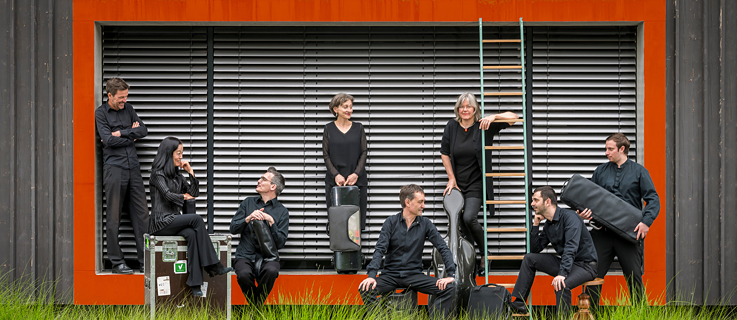Diversity in New Music
Boston
a two-day symposium
The Goethe-Institut Boston, in conjunction with Ensemble Recherche (Freiburg) and Castle of our Skins (Boston), presented a two-day symposium on October 10 and 11, 2022, which brought together local and international creatives actively working to diversify new music repertoire in Boston, Germany, and beyond. Through a mix of virtual and in-person panels, brainstorming sessions and performances, the symposium's aim was to inspire cross-cultural awareness, action and coalition building around the topic of diversity in new classical music.
More information on the symposium
EXPANDING CULTURAL INCLUSIVITY IN NEW MUSIC
wth perspectives from the Global South, USA and Europe
Panellists
Bongani Ndondana-Breen, Composer and Lecturer (South Africa)
Harald Kisiedu, Musician, Musicologist, Lecturer, Researcher (Germany/US)
Jon Silpayamanant, Musician, Composer, Lecturer, Researcher (US/Thailand)
DIVERSIFYING NEW MUSIC REPERTOIRE
A Conversation with Ensemble Recherche (Freiburg), Castle of our Skins (Boston) and ICE (NY)
Panelists:
George E. Lewis
Ashleigh Gordon
Bongani Ndodana-Breen
Clemens K. Thomas
Think Tank
Boston-based musicians were invited to participate in an in-person brainstorming discussion with the musicians of Freiburg-based Ensemble Recherche on ways to build local and international collaboration around the continued diversification in new music. The three-hour discussion took place at the Goethe-Institut Boston, in conjunction with Ensemble Recherche (Freiburg) and Castle of our Skins (Boston), and facilitated by Aliana de la Guardia, artistic director and co-founder of Guerilla Opera. The goal was to inspire cross-cultural awareness and action, and to build a coalition to increase diversity in new classical music.
After some brief introductions and initial icebreakers, the cohort split into smaller groups of 2-4 with the goal of building a knowledge base. The groups identified examples of initiatives they have developed or seen on local levels, then international. They then discussed what they would like to see if there was no limitation to what was possible, also on local and international levels. The Think Tank ended with discussing the resulting commonalities and themes, which were identified by the Thank Tank facilitators, and agreeing on what can be done going forward. To finish, each participant wrote down a personal affirmative statement, which they will be sent in the mail after 6 weeks mail as a reminder.
The meeting was understood as a beginning: a chance to connect and share with like-minded curators both across the Atlantic and within the Boston classical music community. The participants agreed that there is a need for building an international network of curators actively working on diversity and inclusion in the new music canon. Ideally this would be a platform for sharing, discussing and developing pertinent topics and new ideas for projects with international cooperation. Looking forward, the Goethe-Institut plans to facilitate follow-up meetings with Think Tank participants. It will also support international cooperation efforts through initiating educational exchanges across cultural boundaries and helping to identify funding possibilities for potential projects.
The symposium has already lead to a few concrete projects in the pipeline. One project proposal involving artists from Germany, US and South Africa was submitted for the Goethe-Institut’s International Coproduction Fund and is currently under review in the 2nd round. The Bavarian Radio is working on a report on Ensemble Recherche’s A Postcolonial Recherche project that will include perspectives from symposium/Think Tank participants. And there is interest from trade journals to include a symposium review in an upcoming publication. Stay tuned!
Virtual Showcase
A showcase of videos featuring Boston-based music ensembles that demonstrate a diversification along ethnic and/or cultural lines in the new music canon.
click to view Showcase
